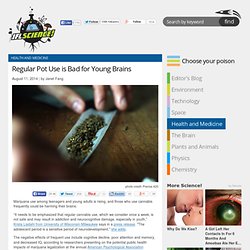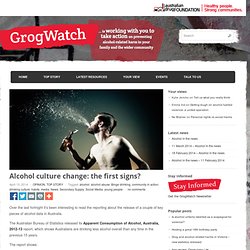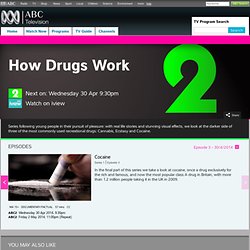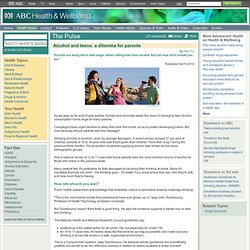

Regular Pot Use is Bad for Young Brains. Marijuana use among teenagers and young adults is rising, and those who use cannabis frequently could be harming their brains.

“It needs to be emphasized that regular cannabis use, which we consider once a week, is not safe and may result in addiction and neurocognitive damage, especially in youth,” Krista Lisdahl from University of Wisconsin-Milwaukee says in a press release. "The adolescent period is a sensitive period of neurodevelopment," she adds. The negative effects of frequent use include cognitive decline, poor attention and memory, and decreased IQ, according to researchers presenting on the potential public health impacts of marijuana legalization at the annual American Psychological Association convention last week in Washington, D.C.
A recent study of 1,037 participants, who have been monitored since their birth until they were 38 years old, found that people addicted to marijuana can lose an average of six IQ points by adulthood. [Via American Psychological Association] Alcohol culture change: the first signs? Over the last fortnight it’s been interesting to read the reporting about the release of a couple of key pieces of alcohol data in Australia.

The Australian Bureau of Statistics released its Apparent Consumption of Alcohol, Australia, 2012-13 report, which shows Australians are drinking less alcohol overall than any time in the previous 15 years. The report shows: 9.9 litres of pure alcohol was available for consumption in 2012-13 for every person in Australia aged 15 years and over. This is 1.6% less than the amount in 2011-12 (10.0 litres) and 8.2% less than 2007-08 (10.8 litres).As a standard drink consists of 12.5mls of pure alcohol, this is equivalent to an average of 2.2 standard drinks per day per person aged 15 years and over.The data also showed a downward trend in beer as the preferred drink – beer 40.9%, wine 37.4%, spirits 13.1%, ready to drinks 6.6% and cider 2%.
The response to this data was a fascinating example of framed viewpoints. How Drugs Work : ABC TV. Series following young people in their pursuit of pleasure; with real life stories and stunning visual effects, we look at the darker side of three of the most commonly used recreational drugs; Cannabis, Ecstasy and Cocaine.

MA 15+ Documentary/Factual 57 mins CC ABC2Wednesday 30 Apr 2014, 9:30pm ABC2Friday 2 May 2014, 11:00pm (Repeat) Share Cocaine Series 1 | Episode 3 Documentary/Factual57 minsCC ABC2Wednesday 30 Apr 2014, 9:30pm ABC2Friday 2 May 2014, 11:00pm (Repeat) In the final part of this series we take a look at cocaine, once a drug exclusively for the rich and famous, and now the most popular class A drug in Britain, with more than 1.2 million people taking it in the UK in 2009. brandTitle: How Drugs Work brandTitleSEO: how-drugs-work brandChannel: ABC2 brandChannelClass: ABC2 brandImage: ZX9610A_460.jpg.
Alcohol and teens: a dilemma for parents - Health & Wellbeing. By Rae Fry Parents are being told to wait longer before letting kids have alcohol.

But just how strict should you be? Published 04/11/2010 [Image source: iStockphoto] As we gear up for end-of-year parties, formals and schoolies week, the issue of managing teen alcohol consumption looms large for many parents. Campaigns have urged families to delay their kids' first drinks, so as to protect developing brains. Drinking at home is common, even for younger teenagers. And a national survey of 12 to 17-year-olds found parents were the most common source of alcohol for those who drank in the previous week. Many parents feel it's preferable for their teenagers to be doing their drinking at home.
How late should you wait? Public health researchers acknowledge that Australian culture is permissive towards underage drinking. "This is the most liberal society that adolescents have ever grown up in," says John Toumbourou, Professor of Health Psychology at Deakin University. Brain damage risk Not just parents. Drugs Campaign - Homepage.